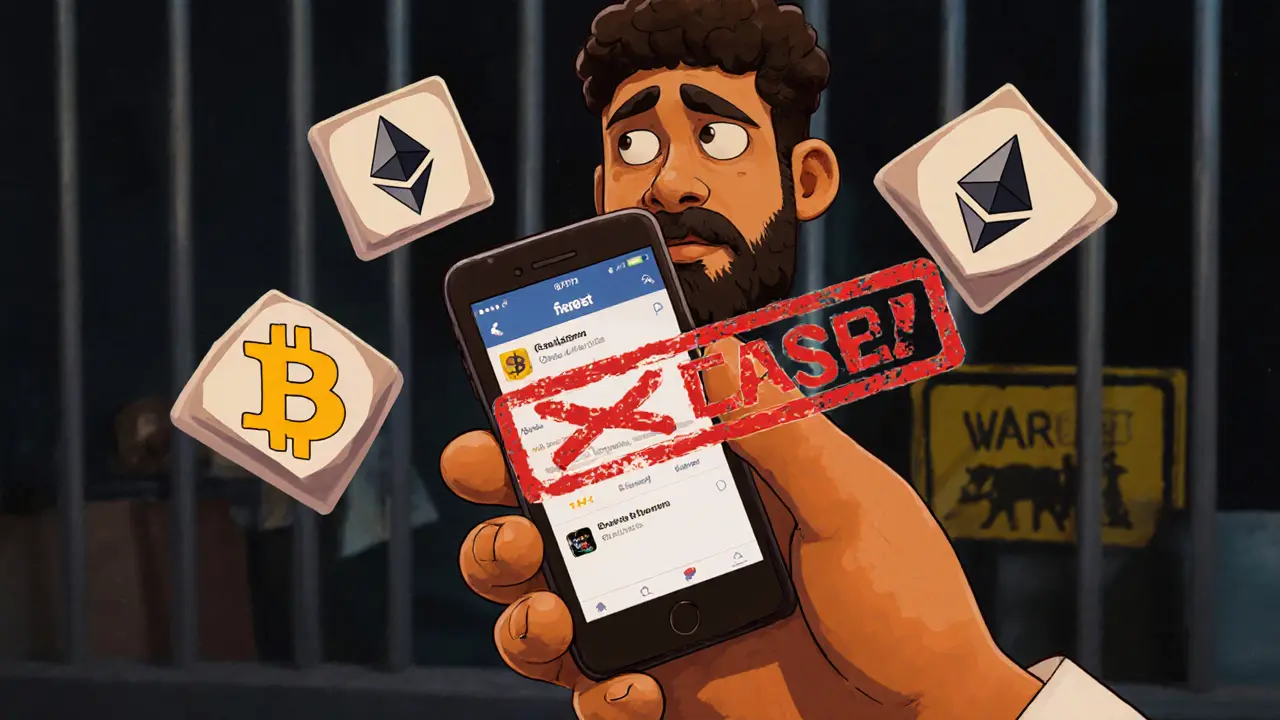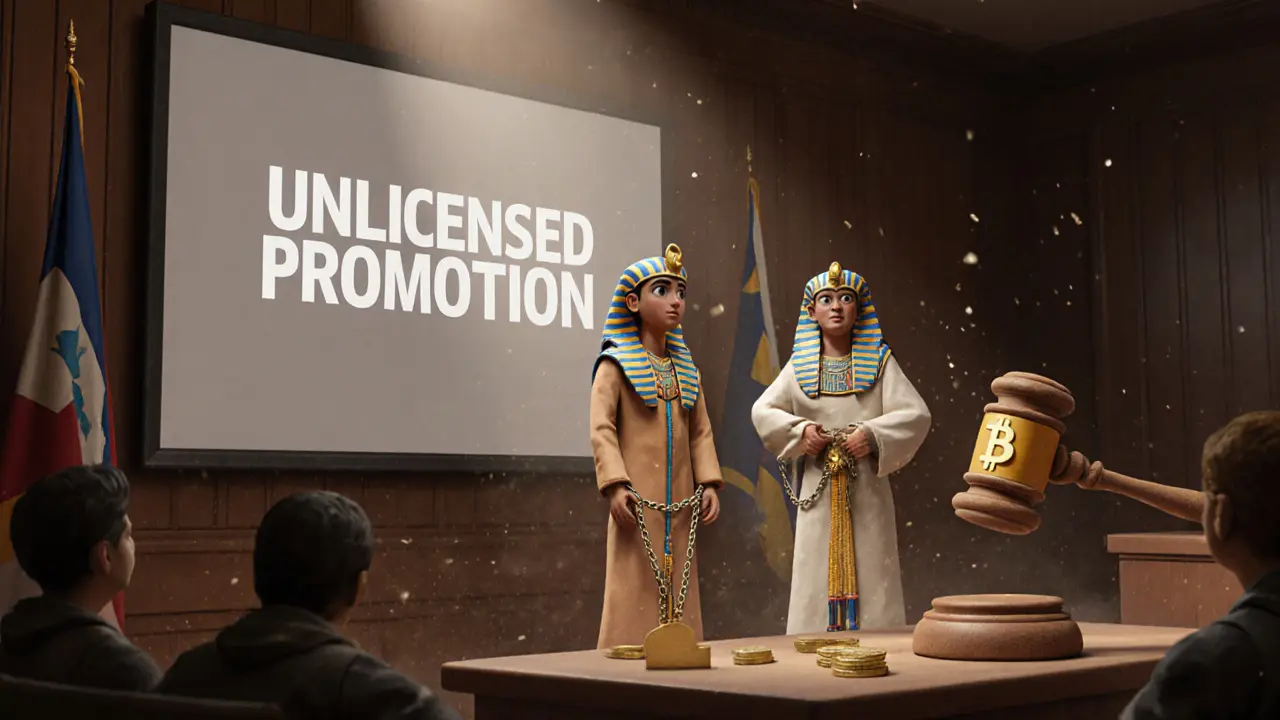Imprisonment Penalties for Crypto Promotion in Egypt: What You Need to Know
 Jul, 23 2025
Jul, 23 2025
If you’re promoting cryptocurrency in Egypt, you could go to jail. Not just a fine. Not just a warning. Actual prison time. And it’s not a rumor - it’s written into law. Since 2020, Egypt has made it a criminal offense to promote, trade, or even advertise crypto without official permission. The penalties? Up to imprisonment and fines of up to 10 million Egyptian pounds - roughly $516,000 USD.
What Exactly Is Illegal?
It’s not just about buying or selling Bitcoin. The law targets anything that sounds like promotion. That includes social media posts encouraging people to invest in crypto. It includes YouTube videos explaining how to use Binance or Coinbase. It includes Instagram ads for staking platforms or NFT marketplaces. Even if you’re not running a business, if you’re telling people to get involved, you’re breaking the law. The Egyptian Financial Regulatory Authority (FRA) is very clear: any activity that involves "receiving or pooling funds for investment" without a license is illegal. That covers DeFi platforms, crypto lending apps, yield farming guides, and crypto influencer content. If your content is designed to attract users to invest in digital assets, you’re on the wrong side of the law - no matter how small your audience is. The Central Bank of Egypt (CBE) doesn’t make exceptions. Even if you’re promoting Ethereum, Solana, or Dogecoin, it doesn’t matter. The law doesn’t distinguish between coins. All cryptocurrencies are treated the same: unregulated, unsafe, and illegal to promote without government approval.Who Enforces This?
The FRA and CBE work together to monitor digital platforms. They scan social media, track websites, and respond to public reports. They even maintain a public "negative list" of unlicensed crypto firms and platforms. If you see someone promoting crypto online and you report them, the authorities may take action. There’s no need for a complaint from a victim. Authorities can act on their own. They don’t need proof that someone lost money. They just need to prove you promoted crypto without a license. That’s it. In practice, this means influencers, bloggers, and even casual posters can be targeted. A single TikTok video saying "Here’s how I made 50% on Solana last month" could be enough to trigger an investigation. The law is broad, vague, and intentionally intimidating.Why Does Egypt Do This?
Egypt’s government doesn’t see crypto as innovation. They see it as a threat. In their view, decentralized money undermines the Egyptian pound. It bypasses state-controlled banking. It opens the door to fraud, money laundering, and cybercrime. The CBE has said since 2018 that crypto has "no underlying value," "no regulatory oversight," and "no government backing." They’re not wrong about the risks. Crypto is volatile. Scams are common. But their solution isn’t education or regulation - it’s criminalization. By making promotion a crime, they hope to scare people away entirely. It’s a blunt instrument, but it’s the only one they’re using. The irony? Egypt has one of the highest crypto adoption rates in Africa and the Middle East. A 2022 report found nearly 1.8 million Egyptians owned crypto - about 1.75% of the population. More recent estimates put that number closer to 3 million. That’s a lot of people using something the government says is illegal to even talk about.
What About NFTs and DeFi?
The law doesn’t just cover Bitcoin and Ethereum. It includes everything tied to blockchain finance. That means NFTs used for investment - like fractionalized art or real estate tokens - are also banned. Staking your crypto to earn rewards? Illegal without a license. Using a DeFi protocol to lend or borrow? Also illegal. The CBE has explicitly stated that staking is "inherently linked to cryptocurrency activities" and falls under the same restrictions. So if you’re running a YouTube tutorial on how to stake ETH on Lido or how to earn yield on Aave, you’re violating Egyptian law. Even blockchain startups trying to build legitimate services in Egypt are stuck. Without a license - and there’s no clear path to get one - they can’t operate legally. The government hasn’t created a licensing framework for crypto businesses. So the only legal option is to do nothing.What Happens If You Get Caught?
The punishment isn’t optional. The law says violators face imprisonment, a fine of 1 to 10 million EGP, or both. That’s not a suggestion. It’s mandatory. Courts can choose to give you jail time, a fine, or both - and they often do both. There’s no minimum sentence listed, so it’s up to the judge. But in practice, first-time offenders might get a fine and probation. Repeat offenders or those with large followings? They’re more likely to face jail. The maximum fine is about half a million dollars - enough to bankrupt most individuals. No one has been publicly sentenced yet for crypto promotion, but that doesn’t mean it’s not happening. Authorities have cracked down on unlicensed platforms and shut down dozens of websites. The silence suggests they’re handling cases quietly - avoiding the spotlight, but still sending a message.
Grace Zelda
November 26, 2025 AT 06:23This is wild. They’re criminalizing conversation about money. If you can’t talk about something without risking jail, that’s not regulation - that’s ideological fear. Crypto isn’t magic, but neither is the Egyptian pound. At least crypto lets people opt out of hyperinflation. They’re punishing people for trying to survive.
SHIVA SHANKAR PAMUNDALAR
November 28, 2025 AT 03:28So let me get this straight - if I post a meme of Dogecoin with ‘to the moon’ in Arabic script, I’m going to prison? That’s not law, that’s performance art by bureaucrats. The real crime is pretending this will stop anyone from using crypto. People are already using it. They’re just doing it in the dark now. And that’s when things get dangerous.
Shelley Fischer
November 29, 2025 AT 20:48The legal framework described here is not merely restrictive - it is fundamentally incompatible with principles of free speech and economic autonomy. By conflating informational content with financial solicitation, the Egyptian state is overreaching in a manner that undermines both rule of law and individual agency. The absence of a licensing mechanism renders compliance impossible, which transforms the statute from regulation into suppression.
Komal Choudhary
December 1, 2025 AT 12:43Wait so if I just say ‘hey I bought some ETH last week’ is that promotion? Like… what if I’m just telling my cousin? Do they send cops to my house? I’m not even trying to make money off this, I just want to know if my grandma can use it to send money to her sister in Lahore without paying 20% fees. This is insane.
Wilma Inmenzo
December 2, 2025 AT 15:27Of course they’re doing this. Did you see the CIA’s 2019 memo on ‘digital currency destabilization’? They’re terrified the dollar’s collapse will spread. This isn’t about crypto - it’s about control. They don’t want you to know you can bypass their rigged system. They’re scared. And scared people lock doors… then throw away the key. And now they’re arresting the people who tried to open the window.
imoleayo adebiyi
December 3, 2025 AT 21:40I live in Nigeria and I’ve seen how people use crypto to survive. My cousin sends money home using Binance P2P - no bank fees, no delays. Egypt’s crackdown is tragic because it’s not stopping adoption - it’s just making it more dangerous. People will still use it, but now they’ll have no support, no education, no safety nets. This isn’t protection. It’s abandonment.
stephen bullard
December 5, 2025 AT 20:15I get why the government is scared - crypto is chaotic, unpredictable, and full of scams. But punishing people for talking about it doesn’t fix the problem. It just hides it. Imagine if we banned people from talking about stocks because the market crashed in 2008. We’d never have learned how to regulate Wall Street. Education, not imprisonment, is the answer. Let people learn. Let them fail. But don’t lock them up for trying.
SHASHI SHEKHAR
December 6, 2025 AT 17:07Let’s break this down properly. The FRA’s definition of ‘promotion’ is dangerously broad - it includes educational content, personal anecdotes, even technical walkthroughs. That means every YouTube tutorial on how to set up a MetaMask wallet is now a criminal act. Every Reddit thread explaining staking is illegal. Every Instagram story saying ‘I earned 8% APY on USDC’ is now a felony. And since there’s no licensing path, every single person who has ever mentioned crypto in Egypt is technically a criminal. This isn’t policy - it’s a legal trap. The government didn’t just ban crypto - they outlawed literacy about it. And the worst part? It’s working. People are too scared to ask questions. That’s how authoritarianism wins - not with force, but with silence.
Abby cant tell ya
December 8, 2025 AT 03:35Ugh. Of course Egypt did this. They’re still stuck in the 1990s. People in this country are using crypto because the currency is garbage. And instead of fixing the economy, they’re punishing the people who noticed. Pathetic. If you’re gonna jail people for talking about money, maybe you should ask why they need to talk about it in the first place.
Janice Jose
December 8, 2025 AT 15:24It’s sad how fear replaces innovation. I hope someone finds a way to push back - quietly, safely. Maybe a decentralized network of educators who share info through encrypted channels. Not to promote, just to protect. People deserve to know their options, even if the government doesn’t like it.